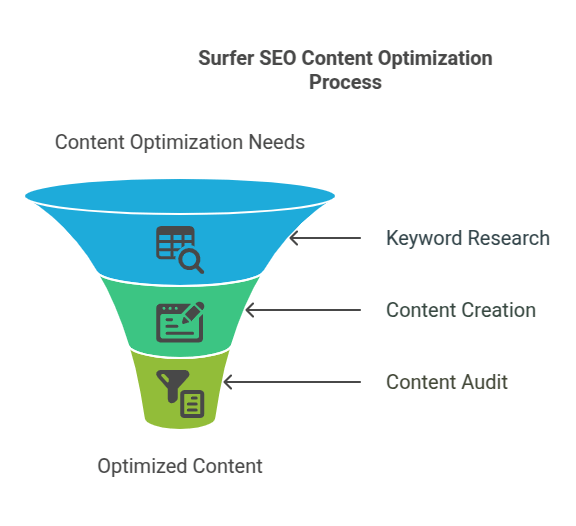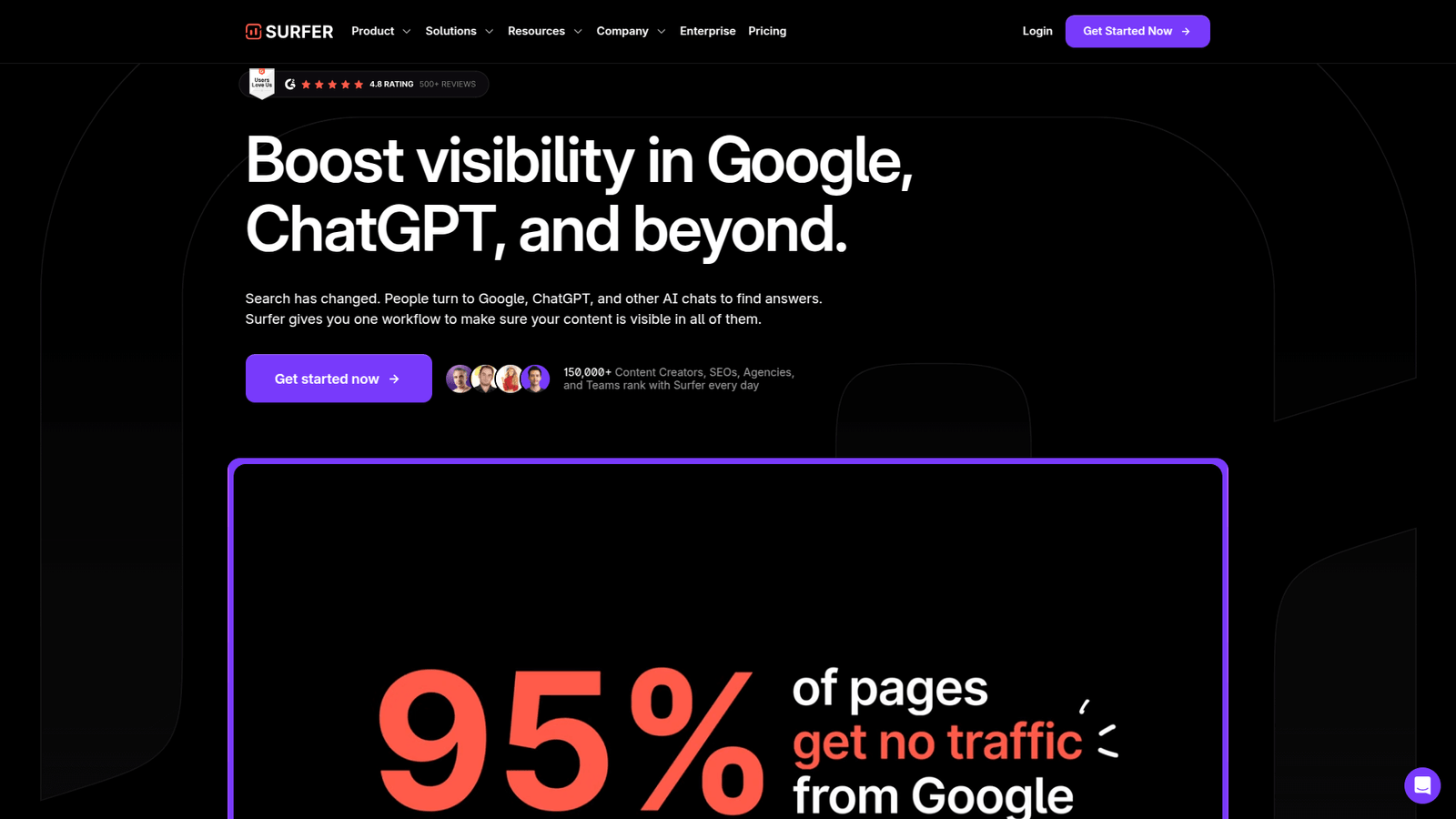Surfer SEO helps you crush SEO Content Optimization fast. Get high-ranking content without the grind. See how it works for Marketing and Sales – try it today!
Surfer SEO Is Built for Marketing and Sales – Here’s Why
Alright, let’s talk shop.
Everyone’s using AI these days, right?
Especially in Marketing and Sales.
It’s not just a trend; it’s how you stay ahead.
But here’s the thing.
AI tools pop up everywhere.
Most of them? Just noise.
They promise the moon but deliver… well, not much.
Especially when it comes to SEO Content Optimization.
That’s where a lot of people get stuck.
They spend hours writing, rewriting, tweaking.
Trying to guess what Google wants.
It’s a time suck.
It’s frustrating.
And honestly? It feels like throwing darts in the dark.
But what if there was a tool built specifically for this?
A tool that understands what marketers and salespeople need.
Something that cuts through the guesswork.
Something that actually helps you get results.
That tool is Surfer SEO.
And today, I’m going to tell you exactly why it’s a game-changer for SEO Content Optimization.
And why you should probably be using it.
Table of Contents
- What is Surfer SEO?
- Key Features of Surfer SEO for SEO Content Optimization
- Benefits of Using Surfer SEO for Marketing and Sales
- Pricing & Plans
- Hands-On Experience / Use Cases
- Who Should Use Surfer SEO?
- How to Make Money Using Surfer SEO
- Limitations and Considerations
- Final Thoughts
- Frequently Asked Questions
What is Surfer SEO?
Okay, first things first.
What exactly is Surfer SEO?
Think of it as your co-pilot for content.
It’s an AI-powered tool.
But it’s not just another writing assistant.
It’s built specifically for search engine optimisation (SEO).
And more specifically, for optimising content so it actually ranks.
It analyses the top-ranking pages for your target keyword.
Then, it gives you actionable insights.
It tells you what elements those top pages have in common.
Things like word count.
Keyword usage, including variations and related terms.
Heading structure.
Image count.
And a whole lot more.
It takes the guesswork out of SEO.
Instead of just hoping your content performs, Surfer gives you a roadmap.
It’s designed for anyone who creates content online.
Bloggers, affiliate marketers, e-commerce store owners.
Content agencies, freelance writers, internal Marketing and Sales teams.
If you need your content to show up in search results, Surfer is built for you.
It aims to make the process of creating high-ranking content faster and more predictable.
No more scratching your head wondering why your amazing article isn’t getting traffic.
Surfer tells you why.
And it tells you what to do about it.
It analyses hundreds of data points in minutes.
Things that would take you days, maybe weeks, to figure out manually.
That’s the power.
It’s not about writing *for* AI.
It’s about writing *with* AI support.
Getting hard data on what actually works in the real search results.
Then using that data to make your content better.
That’s what Surfer does.
It’s your secret weapon for SEO Content Optimization.
A tool that speaks Google’s language.
And translates it into plain English steps for you.
So you can focus on writing great stuff.
While Surfer makes sure it checks all the right SEO boxes.
Simple, right?
That’s the idea.
Key Features of Surfer SEO for SEO Content Optimization

Alright, let’s break down what Surfer SEO actually *does*.
It’s got a few core features that make it stand out.
Especially for SEO Content Optimization.
- Content Editor: Your Writing Dashboard
This is where the magic happens.
You plug in your target keyword.
Surfer analyses the top pages.
Then it gives you a content score.
Think of it like a health score for your content.
The higher the score, the better optimised it is according to Surfer’s analysis of the top results.
It provides real-time feedback as you write.
It tells you if you need more words.
If you should use specific keywords or phrases more or less often.
It gives suggestions for headings.
It even recommends questions to answer.
This isn’t just basic keyword stuffing guidance.
It’s sophisticated analysis based on what’s actually ranking right now.
It helps you include relevant terms that the top pages are using.
These are the semantic keywords, the related concepts.
Stuff that helps Google understand the full topic, not just the exact phrase.
This feature alone saves massive amounts of time.
You’re not guessing; you’re getting data-driven suggestions.
It helps you write content that covers the topic comprehensively.
Just like the content that Google is already rewarding.
You write, Surfer gives feedback.
You adjust, the score goes up.
Simple, effective, powerful.
- Keyword Research: Finding Opportunities
Before you even write, you need the right keywords.
Surfer has tools for this too.
It helps you find relevant keywords with search volume.
It suggests clusters of related keywords.
This is crucial for building topical authority.
Instead of writing one-off articles, you can plan out entire content strategies.
Mapping out groups of keywords that are related.
This signals to Google that you are an expert on a specific subject.
It’s not just about finding one primary keyword.
It’s about understanding the entire topic space.
And finding the terms people are actually searching for.
This research is integrated with the Content Editor.
So the keywords you find here directly inform the optimisation process later.
It ensures you’re targeting terms that matter.
And that you’re covering the topic in a way that meets user intent.
This saves you from writing content nobody is looking for.
Or writing content that doesn’t match what searchers expect.
Targeting the right keywords is step one.
Surfer helps you nail it.
- Audit Tool: Checking Your Existing Content
What about the content you already have?
Maybe you’ve got blog posts from years ago.
They’re gathering dust.
They used to rank, but now they don’t.
Surfer’s Audit tool is perfect for this.
You give it the URL of your existing page and the target keyword.
It analyses the page against the current top-ranking competitors.
It gives you a list of specific recommendations for improvement.
Missing keywords? It tells you which ones to add.
Content too short? It suggests increasing the word count.
Issues with headings or structure? It points them out.
This is huge for breathing new life into old content.
Often, updating and optimising existing pages is faster and easier than writing new ones.
And it can provide a significant boost in rankings and traffic.
It’s like a health check for your website’s content.
Highlighting exactly what needs fixing.
Instead of guessing, you get a clear action plan.
This is a goldmine for anyone managing a large content library.
Making sure your valuable assets are performing their best.
These three features – Content Editor, Keyword Research, and Audit – form the core of Surfer’s SEO Content Optimization power.
They cover the entire process.
From finding the right topic to optimising your writing.
To improving old content.
It’s a complete system.
Benefits of Using Surfer SEO for Marketing and Sales
Why should someone in Marketing and Sales care about Surfer SEO?
Simple.
It directly impacts your bottom line.
Let’s talk benefits.
Time Saving.
This is probably the biggest one.
Manual SEO Content Optimization takes forever.
Analyzing competitors, digging for keywords, checking keyword density…
It’s mind-numbing work.
Surfer automates most of this.
It gives you the data and suggestions instantly.
This frees up your time.
Time you can spend on other crucial tasks.
Like strategy, outreach, or closing deals.
Less time spent on manual SEO means more time making money.
Improved Content Quality.
Surfer doesn’t just tell you where to put keywords.
It helps you understand the *intent* behind the search query.
By analyzing what’s already ranking, it shows you what topics need to be covered.
What questions people are asking.
This helps you create content that is truly helpful and comprehensive.
Content that searchers love.
Content that Google rewards.
Better content leads to higher rankings.
Higher rankings mean more traffic.
More traffic means more leads and potential sales.
Overcoming Creative Blocks.
Ever stare at a blank screen, wondering where to start?
Or how to structure your article?
Surfer helps with this.
It gives you suggested headings, questions, and topics to cover.
It provides a framework.
This structure can kickstart your writing process.
It reduces that feeling of being overwhelmed.
You have a clear plan based on data.
This helps you write faster and more efficiently.
Better Collaboration.
If you work in a team, Surfer provides a common standard.
Writers, editors, and SEO specialists can all work from the same brief.
Using the same scoring system.
Ensuring consistency in your content strategy.
Everyone is on the same page regarding optimisation goals.
This streamlines the content creation workflow.
Reduces back-and-forth revisions related to SEO.
Data-Driven Decisions.
No more guessing.
Surfer provides hard data.
It shows you what’s working for competitors.
It gives you specific metrics to aim for.
This allows you to make informed decisions about your content strategy.
You can see why certain content performs better than others.
And replicate those elements in your own work.
This reduces wasted effort on content that’s unlikely to rank.
It puts your resources where they’ll have the most impact.
For Marketing and Sales teams, this means more qualified organic traffic.
More leads.
Ultimately, more conversions and revenue.
Surfer isn’t just an SEO tool.
It’s a business tool.
It helps you get better results from your content efforts.
More efficiency, higher quality, better performance.
That’s a win in any Marketing and Sales playbook.
Pricing & Plans

Okay, let’s talk money.
Is Surfer SEO going to cost you an arm and a leg?
They don’t have a free plan.
That’s the truth.
But they do have different tiers.
This means you can pick a plan that fits your needs and budget.
Plans are based on the number of content credits and audit credits you get per month.
A content credit is typically one analysis in the Content Editor for a specific keyword.
An audit credit is for checking an existing page.
The cheapest plan is usually aimed at individuals or small teams.
It gives you enough credits to optimise a decent amount of content each month.
Enough to see results, for sure.
Mid-range plans offer more credits and extra features.
Like more comprehensive keyword research tools or higher limits.
The higher-tier plans are for agencies or large businesses.
Lots of credits, team features, API access sometimes.
Compared to alternatives?
Well, you’ve got other tools that do keyword research.
Others that do content analysis.
Some AI writers.
Surfer’s strength is bringing it all together.
Its competitor analysis and content scoring are top-tier.
Some tools are cheaper upfront.
But do they give you the same level of actionable insight based on real SERP data?
That’s the question.
Surfer’s price reflects the depth of its analysis and its focus on actual ranking factors.
Is it an investment? Yes.
But if you’re serious about organic traffic.
If SEO is a key part of your Marketing and Sales strategy.
The potential return on investment (ROI) can be significant.
More organic traffic.
Higher rankings.
More leads.
More sales.
That’s where the cost is justified.
You need to look at it not as an expense, but as a tool to drive revenue.
Check their website for the latest pricing.
They sometimes offer trials or special deals.
But don’t expect a free ride forever.
It’s a professional tool for professionals.
And it’s priced as such.
Worth it? Depends on your goals.
If ranking matters, probably.
Hands-On Experience / Use Cases
Okay, let’s get practical.
What does using Surfer SEO actually *look* like?
Imagine I need to write a blog post about “best project management software.”
First, I’d go to Surfer’s Content Editor.
Type in my keyword: “best project management software.”
Surfer does its thing.
It analyses the top 10-15 ranking pages on Google for that specific keyword in my target country.
It pulls out common ranking factors.
Then, it gives me a dashboard.
On one side, my writing area.
On the other, the Surfer guidelines and score.
It tells me:
Target word count should be around 2000-2500 words. (Based on competitors).
Use these 30-40 keywords/phrases naturally throughout the content. (These are terms the top pages use).
Include around 10-15 headings (H2, H3, H4).
Add 5-8 images.
Answer these common questions. (Pulled from “People Also Ask” and competitor content).
As I start writing, the content score updates in real time.
I add a section about “features to look for”. The score for relevant keywords increases.
I add a list of specific software tools. More related keywords tick up.
Surfer highlights keywords I haven’t used yet.
It warns me if I’m using a term too much (keyword stuffing alert!).
It prompts me to include terms I might have missed.
Terms like “collaboration tools”, “task management”, “Gantt charts”.
Things the top-ranking pages all cover.
It’s not just about putting words on a page.
It’s about covering the topic thoroughly.
In a way that Google expects for that search query.
Once I finish writing, I aim for a high content score.
Usually, 70+ is good. 80+ is better.
Then I know the content is well-optimised based on the current SERP data.
Another use case: Updating old content.
I have a post about “email marketing tips” from two years ago.
It’s dropped in rankings.
I run it through the Audit tool.
Surfer tells me:
Your content is 1200 words; competitors are 1800 words. Need more depth.
You’re missing these 20 key terms competitors are using (e.g., “segmentation”, “automation workflows”, “GDPR compliance”).
Your title tag is too short.
You need more images.
It gives me a checklist of specific fixes.
I go into my CMS, make the changes based on Surfer’s recommendations.
Update the post.
Then I track its performance.
Often, these updated posts see a significant ranking jump.
Because they are now better aligned with what Google is currently rewarding for that keyword.
Surfer makes these tasks straightforward.
It turns complex SEO analysis into simple steps.
It’s like having an SEO expert looking over your shoulder as you work.
Without the hourly rate.
That’s the real value.
Who Should Use Surfer SEO?

Alright, is Surfer SEO for everyone?
Probably not everyone on the planet.
But if you’re involved in Marketing and Sales, and content plays a role, then yes.
Here are some ideal user profiles:
Content Marketers.
If your job is to create content that drives traffic and leads.
Surfer is built for you.
It helps you ensure your blog posts, landing pages, and articles are optimised for search.
Getting more eyeballs on your marketing materials.
SEO Specialists.
This one is obvious.
Surfer automates a lot of the data analysis SEOs used to do manually.
It provides a robust framework for on-page optimisation.
It’s a key tool in an SEO’s arsenal.
Freelance Writers.
Want to offer more value to your clients?
Deliver content that doesn’t just read well, but also has a better chance of ranking.
Using Surfer allows you to provide SEO-optimised content as a premium service.
Making you more valuable and letting you charge more.
Small Business Owners.
Running a small business means wearing many hats.
If you rely on your website for leads or sales.
And you manage the content yourself.
Surfer simplifies the SEO side.
It gives you clear instructions without needing to become an SEO expert overnight.
Agencies (SEO, Content, Marketing).
Agencies manage content for multiple clients.
Consistency and efficiency are key.
Surfer provides a standardized process for content optimisation.
Ensuring high-quality, optimised content delivery across all client projects.
It scales your efforts.
Affiliate Marketers.
For affiliate sites, traffic equals income.
Ranking for product reviews or comparison keywords is essential.
Surfer helps you craft content that outranks competitors for these high-value terms.
Leading to more clicks and commissions.
Anyone Building a Niche Website.
Niche sites live or die by organic traffic.
Surfer helps you target the right keywords.
And create content that dominates those niches.
It’s your roadmap to ranking in a specific topic area.
If you create content online and need that content to perform well in search engines.
Surfer SEO is likely a tool you should consider.
It’s built for the people who need results from their content efforts.
How to Make Money Using Surfer SEO
Alright, let’s talk about the fun part.
Making cash.
How does a tool like Surfer SEO help you do that?
It’s not a magic money printer.
But it enables things that *do* make money.
- Service 1: Offer SEO Content Optimization Services.
This is a direct path.
Many businesses, especially small ones, know they need SEO content.
But they don’t have the skills or the time.
You can use Surfer SEO to offer a specific service.
“I will optimise your existing blog posts for XYZ keyword using Surfer SEO.”
Or “I will write you a perfectly optimised article that follows Surfer’s guidelines.”
Position yourself as someone who uses data-driven methods.
Show them the Surfer score.
Explain how it predicts better rankings.
Businesses pay good money for this.
Because better rankings mean more business for them.
- Service 2: Content Audits and Updates.
Remember the Audit tool?
That’s a service right there.
Many websites have old content that’s underperforming.
Offer to analyse their existing content using Surfer.
Provide them with a report based on the Surfer audit recommendations.
Then, offer to implement those changes for them.
Updating content is often easier to sell than creating brand new content.
And the results can be much faster.
Clients love quick wins.
Surfer’s audit makes finding those opportunities easy.
- Service 3: Building and Scaling Niche Websites.
If you’re building your own assets – affiliate sites, niche blogs, lead generation sites – Surfer is key.
It helps you find profitable keywords.
And create high-ranking content consistently.
More rankings = more traffic.
More traffic = more affiliate sales, ad revenue, or leads.
You can scale these sites faster and more predictably with Surfer.
And eventually, you can sell these assets for a significant multiple of their monthly income.
A well-optimised site built with Surfer is a valuable asset.
Look at someone like Jim. (Hypothetical example, but this happens).
Jim used to write blog posts for clients.
He was good, but his clients didn’t always see ranking improvements.
He started using Surfer SEO.
He showed clients the Surfer score for their drafts.
He explained the data behind his recommendations.
His content started ranking higher.
Clients were happier.
He raised his rates for “Surfer-optimised content”.
He also started offering content audit packages.
Going from charging £100 for a blog post to £200-£300 for an optimised one.
Or £500 for a content audit and update package.
His income went up because he was delivering measurable results.
Made possible by a tool like Surfer.
It’s about leverage.
Surfer gives you the leverage to produce better outcomes faster.
And better outcomes equal more value.
More value equals more money.
Limitations and Considerations
Okay, let’s be real.
No tool is perfect.
Surfer SEO is powerful, but it’s not a magic bullet.
Here are a few things to keep in mind:
It’s a Guide, Not a Replacement.
Surfer tells you *what* elements are common among top pages.
It doesn’t write the content *for* you (though they do have an AI writing feature, the core power is the optimisation).
You still need to be a good writer.
You need to understand the topic.
You need to write engaging, helpful content for humans.
Don’t just stuff keywords to get a high score.
Prioritise readability and value for the reader first.
Then use Surfer to ensure it’s also well-optimised.
Accuracy Depends on Competitors.
Surfer analyses the *current* top-ranking pages.
If the top pages are low quality or poorly optimised themselves (it happens!)…
…Surfer’s recommendations might reflect that.
It’s up to you to use common sense.
Look at the competitors Surfer shows you.
Are they legitimate sites? Is their content actually good?
Use Surfer’s data as a strong guideline, but don’t follow it blindly.
Learning Curve.
It’s not super complicated.
But there’s definitely a learning curve.
Understanding the metrics, how the scoring works, interpreting the suggestions.
It takes a bit of time and practice to get the most out of it.
Don’t expect to be an expert on day one.
But they have tutorials and resources to help.
Can Feel Restrictive.
Sometimes, trying to hit all the Surfer recommendations can feel like writing by numbers.
Especially when you’re new to it.
You might feel constrained by the word count goals or keyword suggestions.
Remember: the score is a guide.
Your primary goal is great content.
Aim for a good score (like 70-80+), but don’t sacrifice readability or flow just to hit 100.
Cost.
As mentioned, it’s not free.
It’s an ongoing subscription cost.
You need to factor that into your budget.
And ensure you’re using it enough to justify the expense.
If you only create content occasionally, it might be overkill.
But if content is a core part of your strategy, it’s likely worth it.
These aren’t reasons *not* to use Surfer.
They are just things to be aware of.
Go in with realistic expectations.
Use it as a powerful tool to support your content efforts.
Not as a magic button that does everything for you.
Final Thoughts
Okay, wrap it up.
Surfer SEO is a serious tool for anyone serious about SEO Content Optimization.
Especially if you’re in Marketing and Sales.
It takes the guesswork out of on-page SEO.
It gives you data-driven insights based on real search results.
This saves you time.
It helps you produce better content.
Content that has a much higher chance of ranking.
Higher rankings mean more organic traffic.
More organic traffic can mean more leads, more sales, more revenue.
That’s the goal, right?
It’s not the only SEO tool you’ll ever need.
You still need technical SEO, link building, good content strategy.
But for the *on-page optimisation* part.
For making sure the content you write meets Google’s unspoken requirements…
…Surfer SEO is incredibly effective.
It’s a powerful assistant for content creators and SEO pros.
It streamlines the workflow.
It provides clarity.
It helps you compete in crowded search results.
If you’re spending a lot of time on content.
And struggling to get it to rank.
Surfer SEO is definitely worth looking into.
Consider it an investment in your organic growth.
It pays for itself by freeing up your time and increasing your traffic.
My recommendation?
If you’re in Marketing and Sales and organic traffic is important…
…you should test Surfer SEO.
See how it fits into your workflow.
See how it changes your results.
It changed mine.
Visit the official Surfer SEO website
Frequently Asked Questions
1. What is Surfer SEO used for?
Surfer SEO is used for optimising web content for search engines. It analyses top-ranking pages for a keyword and provides data-driven recommendations to improve your content’s chances of ranking higher.
It helps with keyword usage, content structure, word count, and other on-page SEO factors.
2. Is Surfer SEO free?
No, Surfer SEO is not a free tool. It operates on a subscription model with different pricing tiers based on usage limits like content credits and audit credits.
They occasionally offer trial periods, but there is no perpetual free plan.
3. How does Surfer SEO compare to other AI tools?
Surfer SEO focuses heavily on SEO content optimization based on real-time analysis of search engine results pages (SERPs). While some other AI tools might focus more on generating raw content, Surfer’s strength is providing the specific data and guidelines needed to make that content rank.
It complements AI writing tools by giving you the SEO framework the AI output needs to adhere to.
4. Can beginners use Surfer SEO?
Yes, beginners can use Surfer SEO. While there’s a slight learning curve to understand all the features, the core Content Editor provides clear, actionable steps.
You don’t need to be an SEO expert to follow its recommendations and improve your content’s optimisation.
5. Does the content created by Surfer SEO meet quality and optimization standards?
Surfer SEO helps you meet *optimisation* standards based on competing pages. It provides the data points. However, the *quality* of the content still depends on the writer.
Surfer ensures the structure and keyword usage are aligned with what’s ranking, but the actual writing, readability, accuracy, and depth come from the human creating the content.
6. Can I make money with Surfer SEO?
Absolutely. Surfer SEO helps you create high-ranking content, which can directly lead to more traffic, leads, and sales for your own business or website.
You can also use Surfer to offer SEO content optimisation, writing, or auditing services to clients, creating new revenue streams based on your ability to deliver data-driven SEO results.






